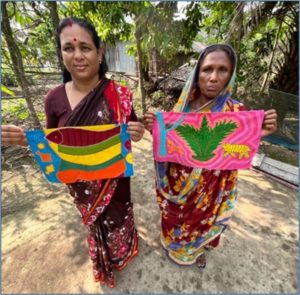
Crafts production is a compelling community-based tourism development strategy for many reasons. First, it typically creates opportunities for a large number of beneficiaries who use crafts as supplementary income in combination with traditional roles as caregivers. Second, it can benefit communities that fall well out of the path of the tourism movement through organized distribution systems. Third, it can benefit those most in need in rural communities such as the elderly and the disabled, and often puts money in the pockets of the people who make the greatest impact in children’s lives…their mothers.
The Sundarbans Artisan action will focus on the establishment of an association of artisans to produce crafts to be sold through local and national sales channels. The crafts product line will focus on quality, low-cost, sustainable items that incorporate natural and cultural motifs into their design and reflect the uniqueness of the Sundarbans, reinforcing conservation messages and in turn visitor awareness and appreciation.
Raw Materials and Artisan Products
The Artisan Network will utilize sustainably sourced wood, clay and fabrics, and other raw materials that can be sourced locally yet don’t require illegal resource extraction from the Sundarbans Reserve Forest. The artisan products will feature conservation themes, such as the iconic Bengal tiger and Irawadi dolphin, rare and threatened species found only in the Sundarbans. The crafts will incorporate conservation messages such as “Motherly Sundarbans” and “Sundarbans…Our National Pride” to raise visitor awareness about the biological importance of the SRF. Cultural motifs will include depictions of Bonbibi as well as s traditional life in the Sundarbans (e.g. fishing, farming).
Distribution & Sales
The Situation Analysis identified more than 500 existing artisans in the Sundarbans Cultural Corridor, yet most limit their sales to chance encounters with passing tourists. The Sundarbans Artisan Network will distribute its crafts to strategic local sales points such as the Ecovillage kiosk at the Karamjal Ecotourism Center, on the 50+ Liveaboard boats entering the SRF, and at high-volume tourism destinations like Mongla & Khulna Ports. National sales distribution will include Dhaka specialty craft stores that feature fair-trade products which support social and environmental causes such as Prabartana, Jatra, Aarong, and Viator…amongst others.
Value Added Skills Development
Work has been conducted by previous tourism development projects to develop basic artisan skills in the Sundarbans to manufacture a number of handicraft items. However, strategic skills development will greatly leverage the economic impact of crafts production in the Sundarbans, including:
- Modifying handicrafts and souvenirs to reflect current visitor demand and trends, as well as to better incorporate conservation themes and messages to help increase public awareness about the biological importance of the Sundarbans
- Improved product costing and pricing, especially to include distribution costs (see below)
- Improved product manufacturing procedures, as well as improved distribution of inventory (to ensure a regular stream of products to new sales points)


